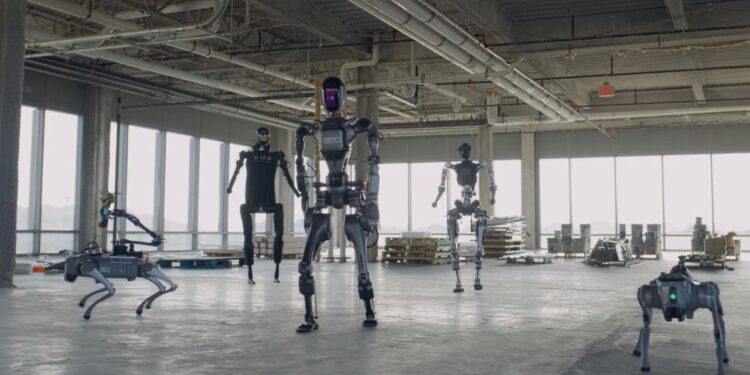Two of the world’s biggest tech companies, Nvidia and Samsung have invested a combined $35 million in Skild AI, a startup that builds software to make robots smarter and more capable.
The investment is part of Skild AI’s Series B funding round, which values the company at $4.5 billion. Japanese investment giant SoftBank is leading the round with a $100 million investment. Nvidia put in $25 million while Samsung contributed $10 million.
This deal shows how serious major tech companies are about robotics becoming the next big thing in technology. The investments come as businesses across many industries struggle to find enough workers to fill open jobs.
The Robot Brain That Adapts
Skild AI isn’t building physical robots. Instead, the company creates what it calls the “Skild Brain” – software that acts like a general-purpose brain for different types of robots. This brain can work with many kinds of robots and help them learn new tasks.
The company’s technology is different from older robot systems that only do one specific job. Skild’s brain lets robots adapt to new situations and learn from experience, much like how humans learn new skills.
Founded in 2023, Skild AI already raised $300 million in Series A funding last July. That round was led by investors including Jeff Bezos, SoftBank, and several major venture capital firms. The company is now valued at three times more than it was less than a year ago.
Why Big Tech Companies Are Investing
For Samsung, the investment helps the company keep up with other tech giants in robotics. The South Korean company already makes robot vacuum cleaners and is working on household robots. Samsung also owns a large stake in Rainbow Robotics, which makes humanoid robots.
Samsung has been making several small robotics investments recently. The company also invested in Physical Intelligence, another robotics startup that raised $400 million and is valued at $2.4 billion.
Nvidia sees robotics as a major growth area for its business. The chip maker has been pushing what it calls “physical AI” – the idea that robots and self-driving cars will become huge markets in the coming years. Nvidia makes the computer chips, software, and services that power smart robots.
The company has invested in other robotics companies including Figure AI and Serve Robotics. Nvidia is also preparing to launch its Jetson Thor platform for robots by mid-2025.
Solving the Worker Shortage Problem
The timing of these investments isn’t random. The United States faces a serious worker shortage, with 1.7 million more jobs available than unemployed workers. Industries like healthcare, construction, warehousing, and manufacturing are hit hardest by this shortage.
Experts predict there will be 2.1 million unfilled manufacturing jobs by 2030. Many of these jobs are also dangerous for humans, such as work on oil rigs or in machine rooms.
Skild AI’s technology could help solve this problem by making robots that can do many different tasks safely alongside humans. The company’s robots have already shown they can do complex household tasks, work in industrial settings, and operate in tough physical conditions.
Competition in the Robotics Race
Skild AI isn’t the only company getting attention from big investors. The robotics industry is heating up as major tech companies race to develop better robots.
Apple, Meta, Amazon, and Google are all investing heavily in robotics. Tesla has been working on its Optimus humanoid robot for years. Chinese companies are also developing AI-powered humanoid robots that worry some industry leaders.
The competition is driving up valuations and investment amounts across the robotics sector. Companies that can prove their robots work in real-world situations are attracting the biggest investments.
From Lab to Real World
Skild AI’s team includes experts from major tech companies like Meta, Tesla, Nvidia, Amazon, and Google. Many team members also come from top universities including Carnegie Mellon, Stanford, and UC Berkeley.
The company’s technology grew out of research at Carnegie Mellon University, following a pattern common among Pittsburgh tech startups.
Unlike many robotics companies that focus on narrow applications, Skild AI is trying to build a general-purpose system. Their goal is to create robots that can work in homes, factories, warehouses, and other environments without needing to be reprogrammed for each new task.
The Road Ahead
The robotics industry still faces many challenges. Making robots that work reliably in unpredictable real-world situations remains difficult. The technology is also expensive, limiting how widely it can be used.
However, the growing labor shortage and advances in AI are creating new opportunities. As robots become more capable and less expensive, they could start filling gaps in industries that desperately need workers.
The investments from Nvidia and Samsung show that major tech companies believe robotics will be a huge market in the coming years. Whether Skild AI can deliver on its promises remains to be seen, but the company now has the funding and backing to find out.
For consumers, these developments could mean seeing more helpful robots in homes, stores, and workplaces over the next few years. The question isn’t if robots will become more common, but how quickly they’ll arrive and what they’ll be able to do.














